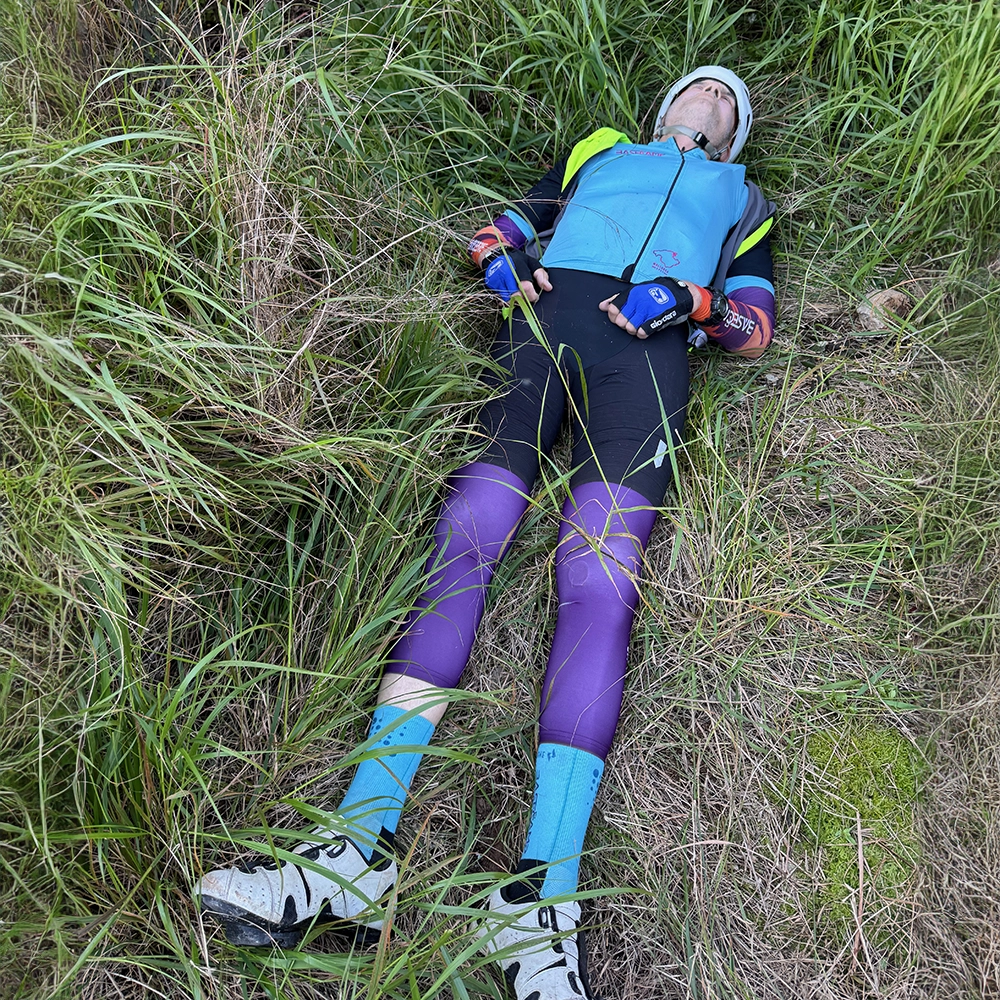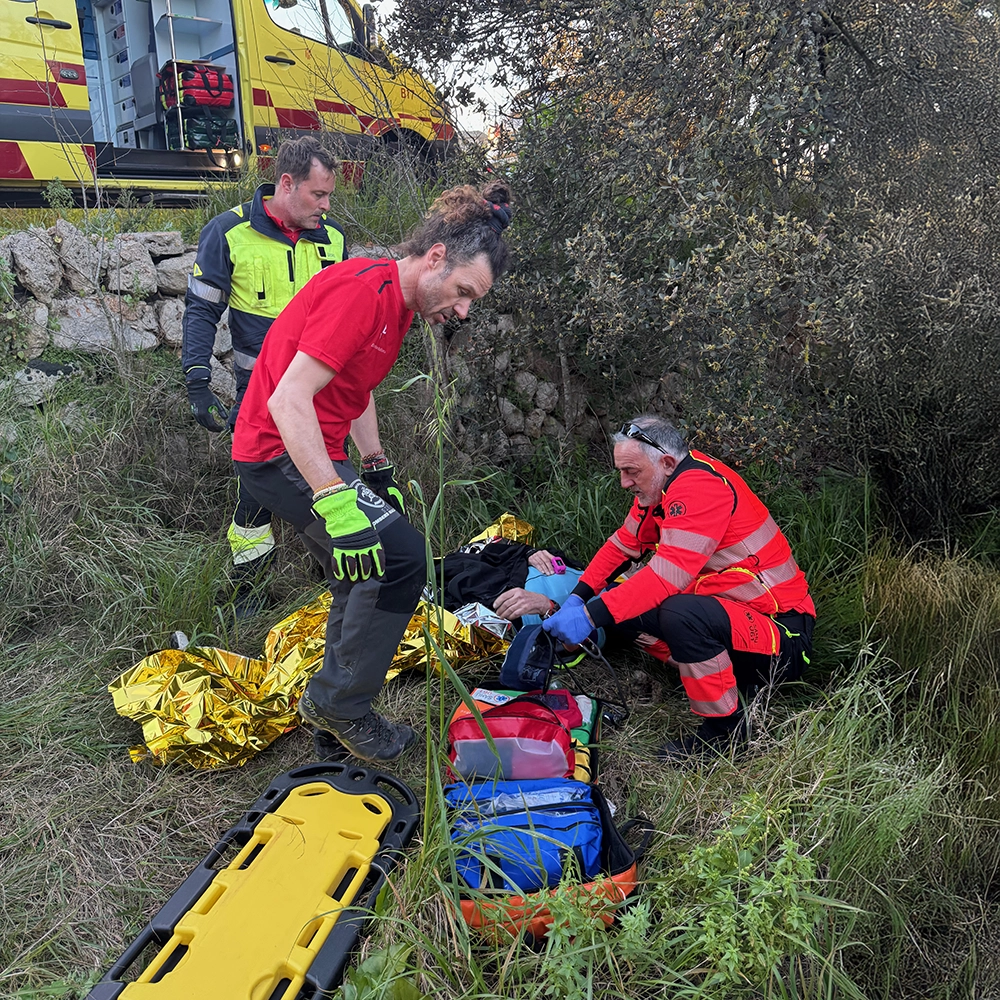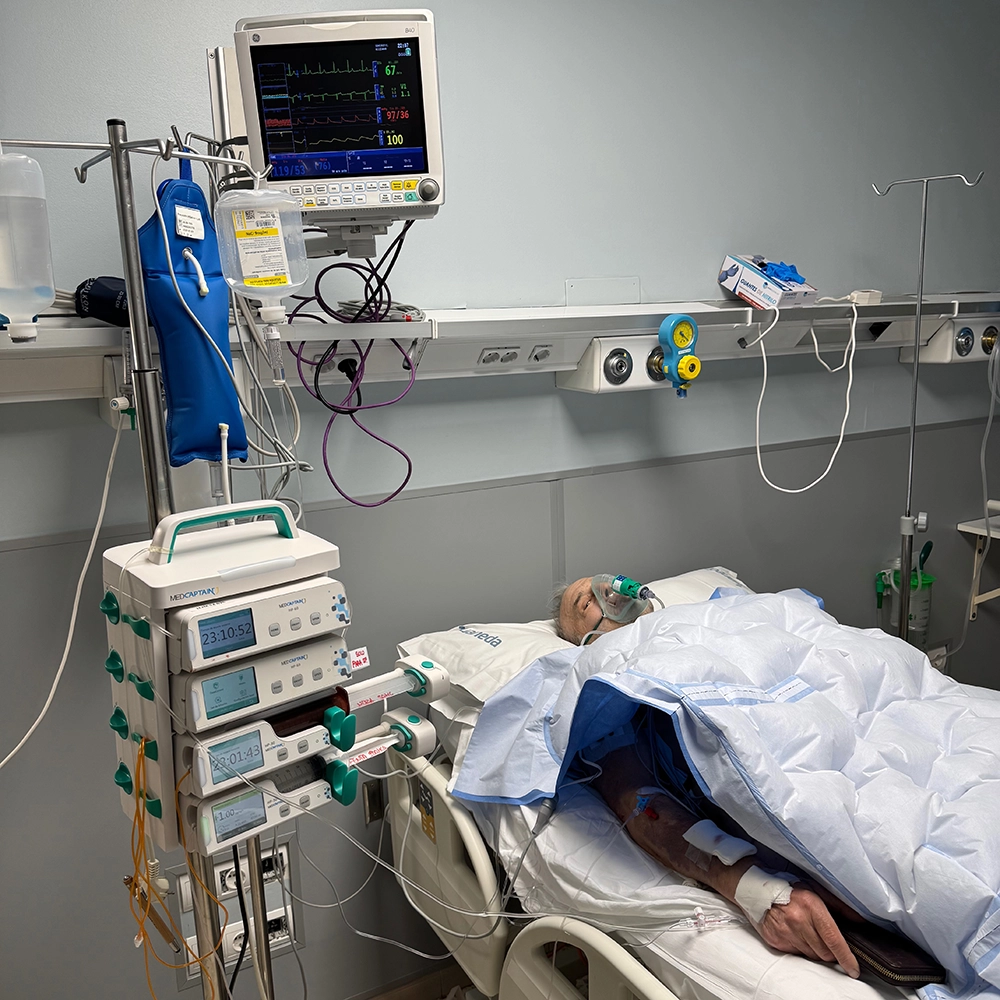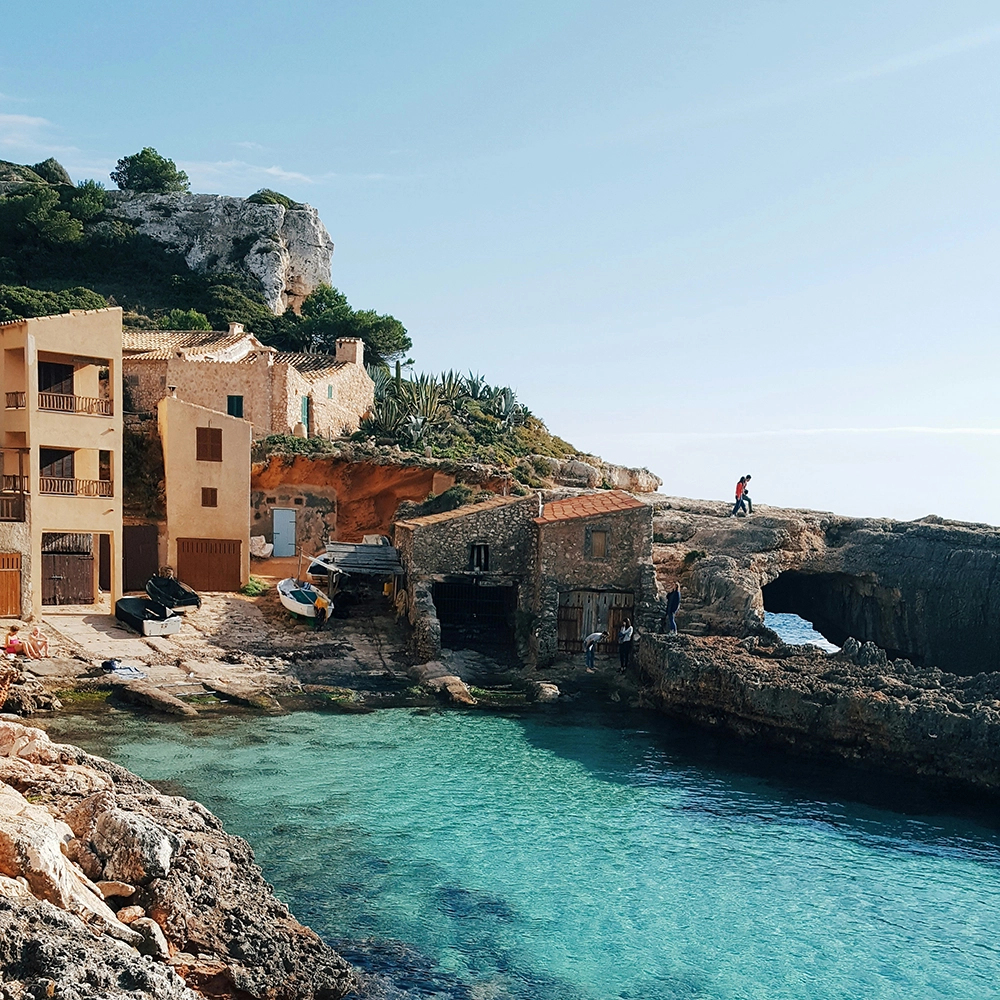"I fell of a f***ing cliff.”
Dr. John Bohnert had been going to Mallorca, Spain, for more than a decade. He’s an experienced cyclist, who rides more miles in a year than most of us do in a lifetime. He was just killing time while a jetlagged friend took a nap. Despite all these mundane factors, he experienced an extraordinary medical emergency that put his life in danger.
Here is John’s story.
Cliff 1, John 0
“I go to Mallorca almost every year,” said John. “For like 15 years, and I go from anywhere from three to five weeks. I was over there for maybe 10 days (before the accident)."
While his friend recovered from the long flight over from the U.S., John decided to take a simple bike ride.
“Somehow, I ended up on this little backroad, and I have no idea how I crashed. I was going two miles an hour. I’m assuming I got a wheel caught.
“This is not my first rodeo. I’ve been doing this for like 50-some-odd years,” John said, pointing out that he bikes about 4,000 miles each year.
When John inexplicably lost control of his bike, he fell. And instead of toppling toward the road, he went the other way, toward the cliffside.
“Essentially, it was a rocky ravine. It was eight feet straight down. Because of where I landed ... I was out of sight. I could hear people walking on this little road, but because I had a collapsed lung, I couldn’t yell loud enough.”
John was able to reach his cell phone and call his friend, who located him with the help of the shared location feature on their phones.
“So he got there and called emergency services. They got me to the nearest hospital where they resuscitated me, then sent me to the trauma hospital. Because I’m not Spanish, I had to go to a private hospital.”
Do You Have to Pay for Healthcare in Spain?
If you require medical treatment in Spain, it’s worth noting that there is both public and private healthcare. You can expect to have different experiences and pay different costs depending on where you are treated.
John’s experience with the private healthcare system wasn’t a great one. Being in Mallorca may have complicated things further. Although the Spanish healthcare system is considered to have high standards, the country’s rural areas and islands, which includes Mallorca, don’t always offer advanced care for severe cases such as John’s.
Public healthcare in Spain is funded by taxes and contributions from residents, which is why we think of Spain as having a universal healthcare system. Private healthcare, however, is typically where non-residents are treated and you can expect to pay for treatment out of pocket, with private insurance, or with travel insurance.
The public system is intended to provide medical treatment to Spanish citizens and those living and work in Spain. As a tourist or visitor, you are not entitled to free healthcare in Spain.
Medical Misfires in Mallorca
By the time John reached the hospital, he was in shock, and it’s no exaggeration to say that his life was hanging in the balance. He spent four weeks in the private hospital, two of those in ICU and another two “on the floor,” being treated for a broken pelvis and collar bone, nine broken ribs, collapsed lungs, and blood in his chest.
John isn’t shy about his opinion of the care he received from Mallorcan medical staff, saying that the food was awful ("I ended up with Uber Eats, which worked really well, by the way”), he had to self-diagnose his own urinary tract infection (he’s a physician himself), and that the hospital did not offer physical therapy (he says he lost 15 pounds of muscle before being discharged).
“American medical care has its own issues with access and money, but for the most part, it’s right up there in the world.”
In Spain, however, John found himself trying to manage his own care and figure out a way to get home while bedridden. His friend, who is also a physician, was able to help to an extent, but it wasn’t until John made Seven Corners aware of his situation that things started to go more smoothly.
Coordinating Care with Seven Corners Assist
Seven Corners’ travel insurance plans come with travel assistance services provided by our Assist Team. Some of the common support they provide include arranging Guarantee of Payment (GOP) when a hospital requires proof of ability to pay before treating a patient, helping a traveler find medical care in a foreign country, and arranging emergency medical evacuations and repatriations.
The Assist Team was in frequent contact with John and his doctors, getting test results, coordinating with our own medical consultants to make sure the correct care was being administered and, when he was ready, arranging for flights and a travel nurse to accompany John on his journey home.
“John’s case presented unique challenges, particularly related to his recovery time,” said Olivia Bailey, Manager of Assist & Medical Management at Seven Corners. “The hospital where he was receiving care was not equipped to provide physical therapy, which was essential for his rehabilitation and for regaining enough strength to travel by plane. Typically, individuals recovering from injuries like John’s receive physical therapy several times a week — sometimes even daily — within the hospital setting.
“Physical therapy was especially important for John, as his mobility was limited, and specific benchmarks must be met to travel on a commercial flight,” explained Olivia, who leads a team of experts highly trained to assist people through some of the scariest moments of their lives.
Some of those benchmarks include being able to transfer from a wheelchair to the seat in the airplane and being able to sit upright. We do try to get lay-down seats if that’s needed, but the traveler still needs to be upright for takeoff and landing.
“Because the hospital could not provide physical therapy, John took the initiative to work independently with the support of a private physical therapist to build strength and improve his mobility before his flight,” said Olivia. “Fortunately, he did not need to be fully recovered before returning home. With the assistance of a medical escort, John was able to travel sooner, benefiting from the added support and care the escort provided.”
John says more than 80 emails were exchanged between him and Seven Corners over the course of his initial recovery. “I got a very fast response any time I emailed somebody. If somebody was out of the office, somebody else responded.”
In some cases, Seven Corners received lab results before John did and was able to continue advocating for the best care possible. John had originally booked a $7,000 flight on his own to get home before Seven Corners stepped in and found better options. “And you took me door to door.”
How to Be Like John
John’s an experienced traveler. Beyond his extensive time in Spain, he’s traveled around the world volunteering his time as a doctor in less-developed countries. He frequently travels with a biking group where the nature of the activity means he’s witnessed his fair share of scrapes and spills. It’s not unusual for him to take other members of the group to a hospital or help them get home.
But (as we say at Seven Corners) trip happens, which is why it’s best to prepare.
Once he was home, John admitted, “One should read one’s policy before one takes off, which I neglected to do because optimistically I said, ‘Ah, I’ll be fine.’ I didn’t realize you guys are taking care of travel arrangements also (when there’s an evacuation), so I was sitting here in my hospital bed trying to get flights.”
This is an area where having a support team like Seven Corners Assist is invaluable. John didn’t initially know that Seven Corners could help him manage care and organize his return to the U.S. He started by trying to schedule his flight home on his own before realizing what his status as a Seven Corners customer could do.
“If you’re laying flat on your back, you don’t have to do the work,” he said. “I was being somewhat optimistic about when I could get out of there. So (having Seven Corners) took a lot of the worry and hassle out of it. I mean, I was sick. I was badly injured. I thought I needed this nurse to travel with me, and your medical people made that decision. It wasn’t me making it. They made it for me.
“You guys were really good about checking up on me."
Olivia offered similar advice based on what she sees every day. “Engage your travel insurance provider as soon as you are hospitalized and maintain regular communication throughout your stay. The more information the team has, the faster they can complete medical reviews and begin making necessary arrangements. Ideally, stay in daily contact, even if there are no changes to your condition. Trust the process and be patient,” she said. “Your safety is our top priority, and we have a responsibility to ensure you are medically stable before boarding a flight.”
Where Is He Now?
Once you get home, follow up with your doctors there, John says, offering another tidbit of advice. Continue to make sure you get the care you need.
With such extensive injuries, John’s recovery was hardly over when he returned to his hometown of Missoula, Montana. Seven weeks after his fall, he was still doing physical therapy and training nearly every day. He was no longer on crutches but still used hiking sticks to help him get around.
Despite the ordeal, he doesn’t see much changing for him. John plans to return to Mallorca like always, and when we talked with him seven weeks after his accident, he expected to be biking outdoors again within the month. He had a trip to California planned for later in the year and another to Italy in the more distant future.
While John admits to not always buying trip cancellation insurance, travel medical insurance is a must for him when he goes overseas. He actually compares it to the medical malpractice insurance he has as a doctor.
“I’ve never used it in 30-some-odd years. I hope to never use it, but if someone wants to sue my butt, then I’m covered.”
When it comes to travel insurance, “You’re fine ‘til you're not.”
And since he’s been back? “I’ve already been recommending you guys to my biking group that I train with in the winter. Not everyone goes to Spain, but it’s still almost 400 people.”
Travel Insurance for Spain
Like John said, you’re fine until you’re not. It’s impossible to predict if or when you’ll face a life-threatening emergency on the road. Why leave it to chance and just hope that you’ll be OK?
For relatively little money — especially compared to what you’d spend on hospital bills and evacuation expenses — you can get valuable travel medical insurance that pays for treatment if you get sick or hurt during your trip.
Remember that your health insurance from home won’t cover you overseas, and your destination’s universal healthcare isn’t guaranteed to cover you, either. That means that those medical expenses, unless you have travel insurance, will end up coming out of your own pocket.
Learn more about travel insurance for Spain. Then get a quick quote online or talk to a licensed agent to find the best travel insurance for your next international adventure.





